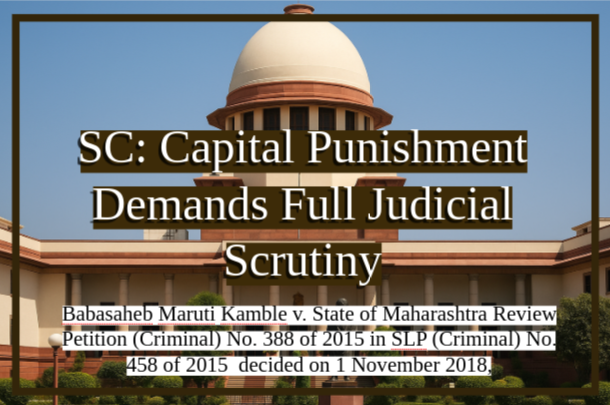SC Upholds Intimidation Conviction but Orders Humanitarian Review of Family Benefits
- M.R Mishra

- Sep 22, 2025
- 2 min read
The Supreme Court’s recent decision in Jameela & Ors. v. State of Madhya Pradesh offers a layered reflection on criminal liability, constitutional protection, and the intersection of justice with humanitarian concerns.
What's The Matter?
The case revolved around the accused a Naib Nazir who had been convicted in 2007 under Sections 305 and 506-B of the IPC. The conviction arose from allegations that The Accused, along with others, had threatened a minor girl into silence after she accused a co-convict of molestation.
Unable to withstand the intimidation, the girl tragically set herself ablaze and succumbed to her injuries. Akhtar’s conviction led to his dismissal from service, ending a career that spanned over three decades.
What Court Said?
The appeal, pursued after The Accused death, by his widow and children, was motivated not by a quest for vindication alone but by the hope of securing terminal benefits long denied due to his conviction. While the High Court had overturned the conviction under Section 305 IPC (abetment of suicide), it replaced it with a conviction under Section 195-A IPC (threatening a witness).
The Supreme Court, however, set aside the 195-A conviction on a crucial constitutional ground: the provision was inserted in 2006, long after the 1999 incident, and applying it retroactively violated Article 20(1).
What remained was the conviction under Section 506-B IPC (criminal intimidation), which the Court upheld after closely scrutinising the testimonies of the victim’s family and witnesses.
The Bench was candid in recognising inconsistencies in the prosecution’s narrative, particularly regarding the number of threats and the absence of the second alleged threat in the FIR.
Yet, it held that such omissions could not override the dying declaration and corroborated evidence pointing to sustained intimidation by the Acussed and his co-convicts.
Crucially, the Court reaffirmed that an FIR is not expected to encapsulate every minute detail and that omissions, unless strikingly material, do not corrode the substratum of the prosecution case.
While dismissing the appeal, the Court faced an unusual situation: The Accused had already died, and the sole surviving issue was whether his family could claim the service benefits he had earned over thirty years.
Recognising the injustice of an absolute denial, the Court directed the State of Madhya Pradesh to reconsider de novo whether a conviction under Section 506-B alone should justify a total forfeiture of such benefits.
The Court advised the government to adopt a “humanitarian approach,” mindful of the widow’s financial condition and liabilities, and to decide within three months.
The Jameela ruling is thus significant not merely for clarifying the scope of offences under Sections 305, 506-B, and 195-A IPC but also for illustrating the judiciary’s role in harmonising strict legality with humane justice.
It reminds us that the law’s duty extends beyond punishment it must also temper harshness with fairness, particularly where the innocent dependents of the accused bear the consequences.







Comments